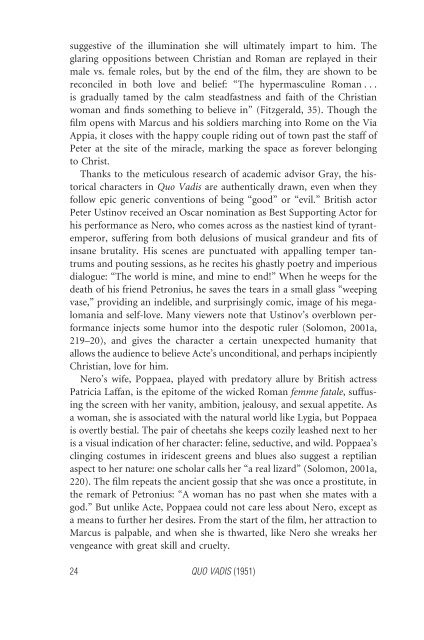Big Screen Rome - Amazon Web Services
Big Screen Rome - Amazon Web Services
Big Screen Rome - Amazon Web Services
Create successful ePaper yourself
Turn your PDF publications into a flip-book with our unique Google optimized e-Paper software.
suggestive of the illumination she will ultimately impart to him. The<br />
glaring oppositions between Christian and Roman are replayed in their<br />
male vs. female roles, but by the end of the film, they are shown to be<br />
reconciled in both love and belief: “The hypermasculine Roman . . .<br />
is gradually tamed by the calm steadfastness and faith of the Christian<br />
woman and finds something to believe in” (Fitzgerald, 35). Though the<br />
film opens with Marcus and his soldiers marching into <strong>Rome</strong> on the Via<br />
Appia, it closes with the happy couple riding out of town past the staff of<br />
Peter at the site of the miracle, marking the space as forever belonging<br />
to Christ.<br />
Thanks to the meticulous research of academic advisor Gray, the historical<br />
characters in Quo Vadis are authentically drawn, even when they<br />
follow epic generic conventions of being “good” or “evil.” British actor<br />
Peter Ustinov received an Oscar nomination as Best Supporting Actor for<br />
his performance as Nero, who comes across as the nastiest kind of tyrantemperor,<br />
suffering from both delusions of musical grandeur and fits of<br />
insane brutality. His scenes are punctuated with appalling temper tantrums<br />
and pouting sessions, as he recites his ghastly poetry and imperious<br />
dialogue: “The world is mine, and mine to end!” When he weeps for the<br />
death of his friend Petronius, he saves the tears in a small glass “weeping<br />
vase,” providing an indelible, and surprisingly comic, image of his megalomania<br />
and self-love. Many viewers note that Ustinov’s overblown performance<br />
injects some humor into the despotic ruler (Solomon, 2001a,<br />
219–20), and gives the character a certain unexpected humanity that<br />
allows the audience to believe Acte’s unconditional, and perhaps incipiently<br />
Christian, love for him.<br />
Nero’s wife, Poppaea, played with predatory allure by British actress<br />
Patricia Laffan, is the epitome of the wicked Roman femme fatale, suffusing<br />
the screen with her vanity, ambition, jealousy, and sexual appetite. As<br />
a woman, she is associated with the natural world like Lygia, but Poppaea<br />
is overtly bestial. The pair of cheetahs she keeps cozily leashed next to her<br />
is a visual indication of her character: feline, seductive, and wild. Poppaea’s<br />
clinging costumes in iridescent greens and blues also suggest a reptilian<br />
aspect to her nature: one scholar calls her “a real lizard” (Solomon, 2001a,<br />
220). The film repeats the ancient gossip that she was once a prostitute, in<br />
the remark of Petronius: “A woman has no past when she mates with a<br />
god.” But unlike Acte, Poppaea could not care less about Nero, except as<br />
a means to further her desires. From the start of the film, her attraction to<br />
Marcus is palpable, and when she is thwarted, like Nero she wreaks her<br />
vengeance with great skill and cruelty.<br />
24 QUO VADIS (1951)



